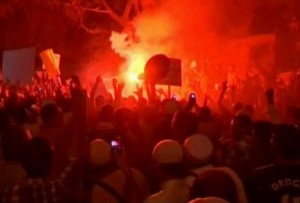UNITED NATIONS — The killing of the American Ambassador to Libya John Christopher Stevens, along with three other American diplomats, the storming of the U.S. Embassy in Cairo, Egypt and the tearing down of the flag replacing the stars and stripes with a black banner, all allegedly in response to an American-produced anti-Islamic video, shows the raw nerve of violent emotions just below the surface throughout the region. These savage attacks, notably on September 11th, raise the specter of wider anti-American violence in a combustible Middle East.
“The U.S. diplomatic presence was deliberately attacked and burned; those claiming responsibility cited a video insulting to Islam as their motivation,” stated Jeffery Feltman, Under-Secretary General for Political Affairs before a emergency meeting of the Security Council. He added “the United Nations rejects defamation of religion in all forms, but there is no justification for violence such as occurred in Benghazi.”

A separate statement by the fifteen-member UN Security Council “condemned in the strongest terms the attack on the United States of America’s diplomatic mission and personnel in Benghazi, Libya… and also condemned in the strongest terms the attack on the United States Embassy in Cairo, Egypt on 11 September.”
A statement by Secretary General Ban Ki-moon added, “Nothing justifies the brutal violence which occurred in Benghazi.”
The timing of the attacks seems searingly focused; September 11th , the day Jihadi terrorists attacked the USA in 2001, and could reflect the Al-Qaida attack pattern.
Benghazi was the first city to rise up against the Colonel Gadhafi dictatorship and it was Benghazi which was saved by the USA, Britain and France in a landmark military action under the dubious policy “responsibility to protect.”
The political sandstorm of the Arab Spring is yet to settle; the region remains the crucible of conflict from North Africa to South Asia. The raging civil war in Syria is propelled by many Islamic fundamentalists who oppose the Assad dictatorship.
The Arab Spring in Egypt is described by the politically feel-good narrative as democratization. Right, until you consider the loss of a flawed but pro-American ally, Hosni Mubarak, and the precipitous tipping of Egypt to a Muslim Brotherhood government which is hostile to Israel, increasingly cozy to China, and wary towards Washington. The loss of Egypt as a close American ally has probably been the biggest setback on the foreign policy front for President Obama.
Ironically, a week before the militant mob attacked the Embassy, the administration was speaking about forgiving one billion dollars of Egypt’s debt owed to the USA to help prop up the country’s teetering economy.
Part of the administration’s mantra is that America’s prestige has returned globally, especially in the Muslim world, since 2009. The formal end of the war in Iraq, and naive American acquiescence if not support for the flood of political regime changes throughout the region, such as in Libya, has presumably made the USA popular again.
Yet, a Pew Poll of views of the United States in Egypt shows marginal support of 27 percent in 2009 (date of the fawning “New Beginning” speech in Cairo) to a dismal 19 percent in 2012. In Turkey, once a solid ally, opinion barely budged from 14 percent support in 2009 to 15 percent today. In Jordan, support slipped from a meager 25 percent in 2009 to 12 percent in 2012.
Brokering the long elusive peace deal between Israel and the Palestinians has less political momentum under Obama than during the Bush administration.
In Afghanistan and Pakistan, what the administration once labeled AFPAK, American and NATO forces are holding their own militarily, but the Taliban enemies know the political clock is ticking and a pullout date has been set.
Pakistan, once a close and indispensable American ally, is simply not on the same page with Washington. There is no doubt Islamabad has long played a double-game with the USA; this is less the fault of the Obama administration than the fact the Pakistanis know they can get away with it. American drone strikes inside Pakistan have led to a dangerously festering relationship between Washington and Islamabad.
According to a recent PEW opinion poll, 74 percent of Pakistanis consider the USA an enemy.
Iran has long confronted and confounded American presidents ever since Jimmy Carter’s hapless policies allowing the Islamic fundamentalist regime to gain power in 1979, not to mention seize the U.S. Embassy and take hostages. The fall of the modernizing Shah, and the evolution of the proud Persian nation into the retrograde Islamic Republic of Iran has proven an unmitigated disaster for the Persian people as well as a dangerously destabilizing force in the region. The clear and present danger from Iran to acquire and possibly use nuclear weapons has grown.
Thirty years later, Barack Obama failed to help a huge pro-democracy movement in 2009 and the USA continues to pay the price of inaction in support to democratic change. UN economic sanctions on Teheran have hindered but not stopped the atomic Ayatollahs.
The clock is ticking in Teheran and much of the Middle East. Are we prepared?
John J. Metzler is a U.N. correspondent covering diplomatic and defense issues. He writes weekly for WorldTribune.com.

